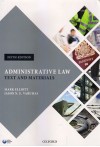- Author(s): Mark Elliot, Jack Beatson, Martin Matthews
- Publisher: Oxford University Press
- Edition: 5 Ed 2017
- ISBN 13 9780198719465
- Approx. Pages 796 + contents
- Format Paperback
.............................................................................................................................
Description
Administrative Law : Text and Materials combines carefully selected extracts key cases, articles , and other sources with detailed commentary and explanation.
Rather than simply presenting administrative law as a straightforward body of legal rules, this engaging, critical text considers the subject as an expression of underlying constitutional and other policy concerns, which fundamentally shape the relationship between the citizen and the state. The result is a fascinating account of a subject of crucial importance and an essential text for undergraduates studying Administrative Law.
.............................................................................................................................
Contents
1. Introductory Matters
1.1 - Administrative Law
1.2 - How is Good Administration to be secured?
1.3 - The Changing Face of Judicial Review
1.4 - The Constitutional Basis of Judicial Review
1.5 - Administrative Power in the Modern Constitution
1.6 - Concluding Remarks
Further Resources
2. Jurisdiction
2.1 - Introduction
2.2 - Errors of Law
2.3 - Applying Statutory Criteria to the Facts
2.4 - Supervision of the Fact-Finding Process
2.5 - Subjective Jurisdictional Criteria
2.6 - Non-Compliance with Statutory Requirements
2.7 - Concluding Remarks
Further Resources
3. The Status of Unlawful Administrative Action
3.1 - Void or Voidable?
3.2 - The Nature of Voidness
3.3 - Managing the Practical Effects of Voidness
3.4 - Collateral Challenge
3.5 - Concluding Remarks
Further Resources
4. The Scope of Public Law Principles
4.1 - Introduction
4.2 - Statutory Powers
4.3 - Prerogative 'Powers
4.4 - De Facto Powers
4.5 - Section 6 of the Human Rights Act 1998
4.6 - Concluding Remarks
Further Resources
5. Retention of Discretion
5.1 - Introduction
5.2 - Delegation of Discretionary Power
5.3 - Discretion and Policy
5.4 - Discretionary Power and Contractual Arrangements
5.5 - Concluding Remarks Further Resources
6. Legitimate Expectations
6.1 - Lawfully Created Expectations
6.2 - Unlawfully Created Expectations
6.3 - Concluding Remarks Further Resources
7. Abuse of Discretion I
7.1 - Introduction
7.2 - Loyalty to the Statutory Scheme: The Propriety of Purpose Doctrine
7.3 - Inputs into the Decision-Making Process: The Relevancy Doctrine
7.4 - Concluding Remarks Further Resources
8. Abuse of Discretion II
8.1 - Introduction
8.2 - Reasonableness and Rationality
8.3 - Proportionality as a Principle of Review
8.4 - Concluding Remarks Further Resources
9. Bias, Impartiality, and Independence
9.1 - The Rule: Its Scope and Rationale
9.2 - Automatic Disqualification
9.3 - The Apprehension of Bias
9.4 - Bias, Policy, and Politics
9.5 - Article 6
9.6 - Concluding Remarks
Further Resources
10. Procedural Fairness
10.1 - The idea of procedural fairness
10.2 - When must decision-makers act fairly?
10.3 - What is the content of the duty to act fairly?
10.4 - Consultation
10.5 - Concluding remarks
11. Giving Reasons for Decisions
11.1 - Introductory matters
11.2 - Why require reason
11.3 - The duty to give reasons at common law
11.4 - Statutory and other duties to give reasons
11.5 - Discharging a duty to give reasons
11.6 - Remedial consequences
11.7 - Concluding remarks
Further Resources
12. Remedies
12.1 - Introduction
12.2 - Injunctions
12.3 - Declarations
12.4 - Relator Proceedings
12.5 - Prerogative Remedies
13.6 - Concluding Remarks
Further Resources
13. The Judicial Review Procedure
13.1 - Introduction
13.2 - What is the Judicial Review Procedure?
13.3 - When Must the Judicial Review Procedure be Used?
13.4 - Concluding Remarks
14. Restriction of Remedies
14.1 - Introduction
14.2 - Permission
14.3 - Exhaustion of Alternative Remedies
14.4 - Time Limits
14.5 - Prematurity and Ripeness
14.6 - Exclusion of Judicial Review
14.7 - Standing
14.8 - Concluding Remarks
Further Resources
15. Liability of Public Authorities
15.1 - Introduction
15.2 - Relationship with judicial review
15.3 - The Law of Torts
15.4 - Damages under the Human Rights Act 1998
15.5 - State liability in EU law
15.6 - Contract
15.7 - Restitution
Further Resources
16. Delegated Legislation
16.1 - General matters
16.2 - The Making of Delegated Legislation
16.3 - Parliamentary Scrutiny
16.4 - Judicial Scrutiny
16.5 - Concluding Remarks Further Resources
17. Inquiries
17.1 - Two types of inquiries
17.2 - Ex ante inquiries
17.3 - Ex post inquiries
17.4 - Conducting remarks
Further Resources
18. Statutory Tribunals
18.1 - Introduction
18.2 - The Independence of Tribunals
18.3 - Procedure in Tribunals
18.4 - Appeals and the System of Tribunals
18.5 - The Supervision and Accountability of Tribunals
18.6 - Concluding Remarks
Further Resources
20. Ombudsmen
19.1 - Introduction
19.2 - Bodies Subject to Investigation
19.3 - Matters Subject to Investigation
19.4 - The Conduct of Investigations
19.5 - Problems and Reform
19.6 - Concluding Remarks
Further Resources
.............................................................................................................................
About the Author
Dr. Mark Elliott is a Lecturer in Law and Assistant Director of the Centre for Public Law
at the University of Cambridge. He is also a Fellow of St Catharine's College, Cambridge.
Sir Jack Beatson FBA, formerly Rouse Ball Professor of English Law at the
University of Cambridge, is a Justice of the High Court, Queen's Bench Division.
Martin Matthews is a Fellow and Praelector in Jurisprudence at University College,
Oxford and a C.U.F. Lecturer in Law at the University of Oxford.
.............................................................................................................................

